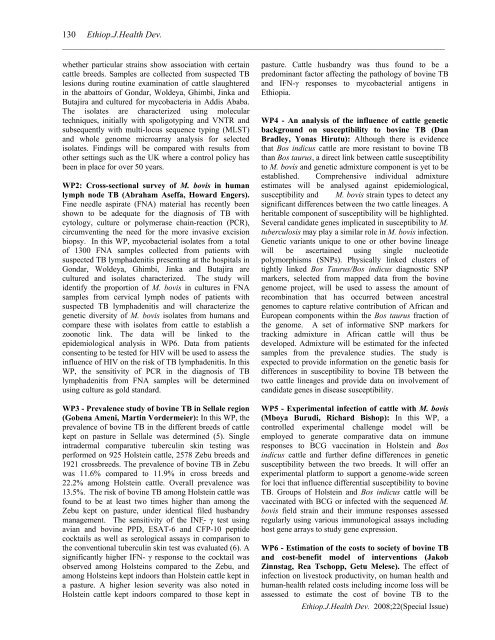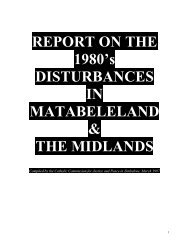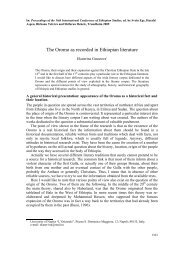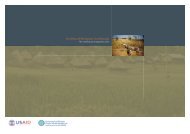You also want an ePaper? Increase the reach of your titles
YUMPU automatically turns print PDFs into web optimized ePapers that Google loves.
130 Ethiop.J.Health Dev.<br />
______________________________________________________________________________________<br />
whether particular strains show association with certain<br />
cattle breeds. Samples are collected from suspected TB<br />
lesions during routine examination of cattle slaughtered<br />
in the abattoirs of Gondar, Woldeya, Ghimbi, Jinka and<br />
Butajira and cultured for mycobacteria in Addis Ababa.<br />
The isolates are characterized using molecular<br />
techniques, initially with spoligotyping and VNTR and<br />
subsequently with multi-locus sequence typing (MLST)<br />
and whole genome microarray analysis for selected<br />
isolates. Findings will be compared with results from<br />
other settings such as the UK where a control policy has<br />
been in place for over 50 years.<br />
WP2: Cross-sectional survey of M. bovis in human<br />
lymph node TB (Abraham Aseffa, Howard Engers).<br />
Fine needle aspirate (FNA) material has recently been<br />
shown to be adequate for the diagnosis of TB with<br />
cytology, culture or polymerase chain-reaction (PCR),<br />
circumventing the need for the more invasive excision<br />
biopsy. In this WP, mycobacterial isolates from a total<br />
of 1300 FNA samples collected from patients with<br />
suspected TB lymphadenitis presenting at the hospitals in<br />
Gondar, Woldeya, Ghimbi, Jinka and Butajira are<br />
cultured and isolates characterized. The study will<br />
identify the proportion of M. bovis in cultures in FNA<br />
samples from cervical lymph nodes of patients with<br />
suspected TB lymphadenitis and will characterize the<br />
genetic diversity of M. bovis isolates from humans and<br />
compare these with isolates from cattle to establish a<br />
zoonotic link. The data will be linked to the<br />
epidemiological analysis in WP6. Data from patients<br />
consenting to be tested for HIV will be used to assess the<br />
influence of HIV on the risk of TB lymphadenitis. In this<br />
WP, the sensitivity of PCR in the diagnosis of TB<br />
lymphadenitis from FNA samples will be determined<br />
using culture as gold standard.<br />
WP3 - Prevalence study of bovine TB in Sellale region<br />
(Gobena Ameni, Martin Vordermeier): In this WP, the<br />
prevalence of bovine TB in the different breeds of cattle<br />
kept on pasture in Sellale was determined (5). Single<br />
intradermal comparative tuberculin skin testing was<br />
performed on 925 Holstein cattle, 2578 Zebu breeds and<br />
1921 crossbreeds. The prevalence of bovine TB in Zebu<br />
was 11.6% compared to 11.9% in cross breeds and<br />
22.2% among Holstein cattle. Overall prevalence was<br />
13.5%. The risk of bovine TB among Holstein cattle was<br />
found to be at least two times higher than among the<br />
Zebu kept on pasture, under identical filed husbandry<br />
management. The sensitivity of the INF-� γ test using<br />
avian and bovine PPD, ESAT-6 and CFP-10 peptide<br />
cocktails as well as serological assays in comparison to<br />
the conventional tuberculin skin test was evaluated (6). A<br />
significantly higher IFN- γ response to the cocktail was<br />
observed among Holsteins compared to the Zebu, and<br />
among Holsteins kept indoors than Holstein cattle kept in<br />
a pasture. A higher lesion severity was also noted in<br />
Holstein cattle kept indoors compared to those kept in<br />
pasture. Cattle husbandry was thus found to be a<br />
predominant factor affecting the pathology of bovine TB<br />
and IFN-γ responses to mycobacterial antigens in<br />
Ethiopia.<br />
WP4 - An analysis of the influence of cattle genetic<br />
background on susceptibility to bovine TB (Dan<br />
Bradley, Yonas Hirutu): Although there is evidence<br />
that Bos indicus cattle are more resistant to bovine TB<br />
than Bos taurus, a direct link between cattle susceptibility<br />
to M. bovis and genetic admixture component is yet to be<br />
established. Comprehensive individual admixture<br />
estimates will be analysed against epidemiological,<br />
susceptibility and M. bovis strain types to detect any<br />
significant differences between the two cattle lineages. A<br />
heritable component of susceptibility will be highlighted.<br />
Several candidate genes implicated in susceptibility to M.<br />
tuberculosis may play a similar role in M. bovis infection.<br />
Genetic variants unique to one or other bovine lineage<br />
will be ascertained using single nucleotide<br />
polymorphisms (SNPs). Physically linked clusters of<br />
tightly linked Bos Taurus/Bos indicus diagnostic SNP<br />
markers, selected from mapped data from the bovine<br />
genome project, will be used to assess the amount of<br />
recombination that has occurred between ancestral<br />
genomes to capture relative contribution of African and<br />
European components within the Bos taurus fraction of<br />
the genome. A set of informative SNP markers for<br />
tracking admixture in African cattle will thus be<br />
developed. Admixture will be estimated for the infected<br />
samples from the prevalence studies. The study is<br />
expected to provide information on the genetic basis for<br />
differences in susceptibility to bovine TB between the<br />
two cattle lineages and provide data on involvement of<br />
candidate genes in disease susceptibility.<br />
WP5 - Experimental infection of cattle with M. bovis<br />
(Mboya Burudi, Richard Bishop): In this WP, a<br />
controlled experimental challenge model will be<br />
employed to generate comparative data on immune<br />
responses to BCG vaccination in Holstein and Bos<br />
indicus cattle and further define differences in genetic<br />
susceptibility between the two breeds. It will offer an<br />
experimental platform to support a genome-wide screen<br />
for loci that influence differential susceptibility to bovine<br />
TB. Groups of Holstein and Bos indicus cattle will be<br />
vaccinated with BCG or infected with the sequenced M.<br />
bovis field strain and their immune responses assessed<br />
regularly using various immunological assays including<br />
host gene arrays to study gene expression.<br />
WP6 - Estimation of the costs to society of bovine TB<br />
and cost-benefit model of interventions (Jakob<br />
Zinnstag, Rea Tschopp, Getu Melese). The effect of<br />
infection on livestock productivity, on human health and<br />
human-health related costs including income loss will be<br />
assessed to estimate the cost of bovine TB to the<br />
Ethiop.J.Health Dev. <strong>2008</strong>;22(Special Issue)







